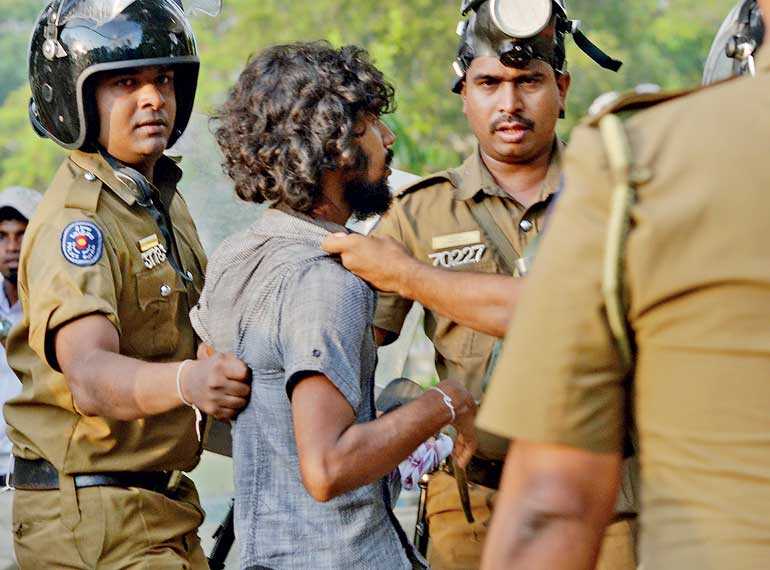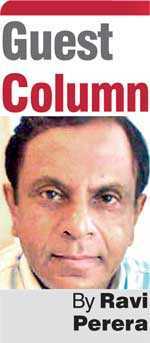Wednesday Mar 04, 2026
Wednesday Mar 04, 2026
Tuesday, 19 June 2018 00:00 - - {{hitsCtrl.values.hits}}

Almost from the time of independence our State-funded universities have been hotbeds of political agitation; not out of resident issues or an inherent political vision of the students, but almost always on the encouragement and manipulation by outside political forces, mainly the left parties. Today, Sri Lankan universities are perhaps the only universities in the world having this kind of constant student agitation. In the meanwhile, the quality of our university education has steadily declined, hardly considered for ranking even among the Asian universities now
– Pic by Shehan Gunasekara
“The job of no minister, no official was secure for a day. Corrupt fools succeeded corrupt oafs in the highest positions in the land, and fools were removed to make room for imbeciles” – The Shadow of the Winter Palace, the Drift to Revolution – Edward Crankshaw
“One quality I admire about the Sri Lankans is their capacity to accept, or let us say reconcile with all the wrongs happening in their lives. Things that we in the West get het-up about, fazes them not. They take them as things to be endured, not challenged; yet another impediment in an endless cycle of life and death.
“Somebody from the Works Department will come and dig up in front of their house, blocking access. They write to a Government agency, there is no response. Make an appointment to meet an official, he never turns up. Even if you meet the guy, nothing happens. It is not only with the Government, in almost every sphere of life their expectations are minimal: go to an eatery, the crockery looks aged, not so clean, get into a bus, its driven like cattle transport , power supply is interrupted regularly, unannounced.
“Compounding a dismal reality, they are squeezed by the rising cost of consumer items brought about by inflation, made worse by a weak currency. With all this, I will not say they are an unhappy people. The famous Sri Lankan smile greets you everywhere. In their reconciliation with the unpleasantness of the external, there is something for us to learn.”
Peter, a Canadian, is a regular visitor to Sri Lanka. The country’s exotic nature, cultural strangeness, the erratic beat of its public life, fickleness of its institutions fascinates him. To a visitor from the West, the bonuses of holidaying in a peripheral country in the tropics are irresistible; the warm weather, lush tropical greenery and the bounty that the dollar yields promises unhurried days of ease and indulgence. The tourism dollar is much valued, the tourist most welcome in every sphere.
Although on holiday mode, and carefree, Peter observes the moving scene with shrewd, assessing eyes. He reads the local English newspapers, following the news programs on TV with interest.
“I can relate comfortably to your institutions; the Parliament, Government departments, Judiciary, universities, the constabulary and so on. These are based on British institutions which were established in all former colonies. In my country too there are identical institutions. However, going by the general perception, these institutions seem to be interpreted differently here, seen through different eyes; performing indifferently, in a permanent state of disorder.”
As we spoke there on the TV was a news item on university students protesting some issue; scrawny, dishevelled young men screaming out slogans down the busy Galle Road, causing chaos on the Colombo streets. This is not a new phenomenon. Almost from the time of independence our State-funded universities have been hotbeds of political agitation; not out of resident issues or an inherent political vision of the students, but almost always on the encouragement and manipulation by outside political forces, mainly the left parties.
Today, Sri Lankan universities are perhaps the only universities in the world having this kind of constant student agitation. In the meanwhile, the quality of our university education has steadily declined, hardly considered for ranking even among the Asian universities now. Anybody who can afford it, including our legislators and senior administrators, will not consider them, preferring an overseas education for their children.
The young agitators of yesteryear have become the administrators of the State now. They who knew the solutions then, are the policymakers/implementers of today. Social injustices they railed against with such passion in the 1970s and ’80s, they have come to symbolise many times more!
Incompetent, unresponsive, colourless and corrupt, we have a public service simply not capable of delivering the needs of the 21st Century, defining their role by paying hosannas to politicians or collecting the filthy lucre in the car parks of Colombo hotels. Even a simple office circular drafted by our university products is distinguished only by its ineptness; unhelpful, often contradictory, unfathomable to the public.
“In this country it is nearly impossible to find out the exact procedure when dealing with the Government. In my country, the required guidance is available, even on line. Your dealings with the government are made clear and transparent. What you need to provide to obtain a visa, an import permit, building approval, registering a company and so on are clearly stated. If you follow the guidelines, nothing will go wrong. Even when there are problems, the officers use their discretion, in almost every situation, satisfactorily. In any human endeavour there are always the exceptions, yet it is very rare to have a public servant soliciting a gratuity for his services. There is pride in doing a service well and honestly.
“It seems the Sri Lankans value the personal touch a lot. To get Government approval you need to meet an official personally. You have to go to him, not on the phone, mind you. Going to him has a cultural meaning, you are the supplicant. If your attitude is humble enough, he may be moved to grant you the favour.”
Often, the attitude of the decision maker is so preposterous, it seems an offence against nature to have such a person in a decision making situation. The type of education they have received cannot give what the character lacks sorely. For many, holding a position in the Government bureaucracy is a rise in life, an affirmation of one’s self-worth, much more than a mere livelihood to be performed dutifully. Without his office the man has no stature or personal worth. You amount to something only because you stamp a seal on a document. Without that seal the piece of paper cannot be moved for the next seal! The file is not complete! The passport is not stamped!
It is not in their interest to show up the system as dysfunctional, ridiculous and corrupt. So the system is made to look complex, mysterious; sage men making ponderous decisions! Why and how the administration works is not for the public to understand. Centuries of harsh feudal governance has conditioned the people to expect no civility from it, leave alone asking questions. Culturally, they relate to the cumbersome ritual of the public servant: a holy man in an inscrutable communion with the mysterious. It matters not that the language of the holy man’s commune is incomprehensible, as long as he can bestow the blessings! And what godly harm is there in giving occasional gifts to this intermediary with the unknowable!
Like everything else around us, our administration too is the creation of the intelligence, abilities and the attitudes of the thousand who constitute the service, past as well as present. Not all are bad and inefficient. But none can escape the enveloping culture, it is not the exceptionally good nor the nasty public servant that will determine the overall quality of the service , but the mean, the overwhelming majority; the mediocre, indifferent, incapable mass.
It is the same with our roads; neither the careful, courteous driver nor the reckless, drunk driver defines our road culture. They are only the few, the exceptions, standing at the extreme ends. Our roads are defined by the culture, attitudes and the thinking of the vast majority; the heedless pedestrians, the three wheelers, bus and other drivers who mock the meaning of a public road.
Canada is a country that scores high in the living standards, happiness index as well as surveys of countries with well-run governments. In the rankings of the Transparency International, Canada is among the least corrupt. On the other hand, Sri Lanka is somewhat at the lower end of the mediocre in these indexes, gradually descending in the order.
“It is strange, sometimes at airports I meet Sri Lankans who are working at managerial levels in international organisations and companies. As senior administrators they draw good salaries and perks, travel business class, if an airport transit is needed, relax in first class lounges. I suppose they hold themselves out as persons capable of functioning at high levels in different countries and cultures, adding value and addressing difficult issues. But in their own country, there is much to be desired. This is a dilemma.”